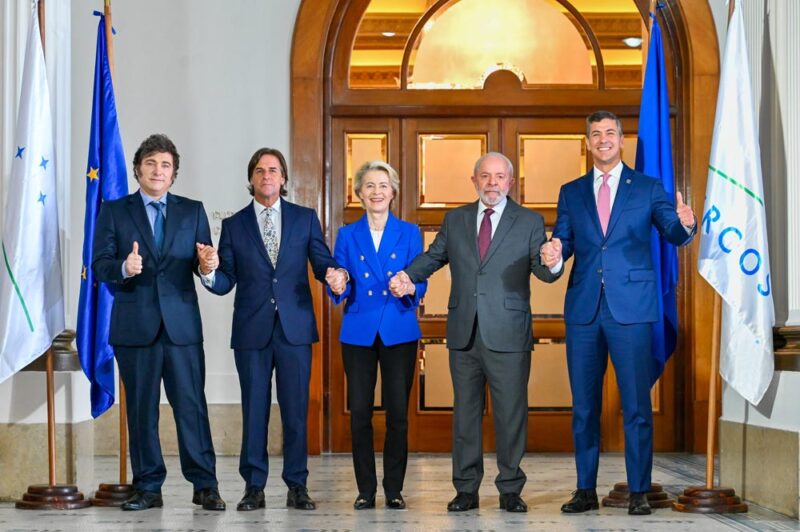After more than 25 years of negotiations, the agreement between the European Union (EU) and the Common Market of the South (MERCOSUR) was signed on 6 December 2024, constituting the world’s largest free trade area. Both parties to the agreement publicly touted it as a great commercial and political opportunity. However, it is a controversial agreement, with some actors opposing it from the outset. Let’s look at why.
The main obstacle to the agreement has been from farmers in European countries, who fear that their products will be displaced by imports from MERCOSUR countries at lower prices, and who are a strong enough actor to ensure that countries such as France have historically always opposed the agreement.
It is important to quickly explain what MERCOSUR is and what we mean by ‘free trade area’. On the one hand, MERCOSUR is a regional integration process between Argentina, Brazil, Paraguay and Uruguay, in which Bolivia is in the process of joining and Venezuela is temporarily suspended. It is an open integration process, i.e. it is constantly evolving and its main objective is to generate a common market to promote trade and investment opportunities between the states that form part of the integration, but also as a bloc for joint insertion into the international market. If its member countries are taken into account as a trade bloc, it is the world’s fifth largest economy.
If the EU-MERCOSUR agreement worries farmers, it worries even more certified organic food producers
On the other hand, a free trade area refers to a region made up of at least two states that cooperate to reduce tariffs and increase trade in goods and investment between them. The agreement reached between the EU and MERCOSUR is therefore a major free trade agreement between the two blocs that will create a trade and investment area in which they are politically committed to facilitating the terms of trade. However, it is worth noting that the agreement has been signed by all MERCOSUR states, but is still awaiting ratification, which means that the agreement could face obstacles before it enters into force

Author: Dati Bendo – European Commission | © European Union 2025
Challenges to the MERCOSUR-EU trade agreement
Exports from all MERCOSUR member states (to countries outside the trading bloc itself, i.e. extra-MERCOSUR exports) are essentially primary products, including iron ore, soya and its derivatives in oil, crude oil, maize, sugar and various meats, and to a lesser extent coffee, wheat and fruit and vegetables (export data for 2022). At present, the EU is not MERCOSUR’s largest trading partner, but, as noted above, the entry into force of the treaty between the two blocs could bring about a major change in trade dynamics, as it would be the largest free trade area in the world.
In this sense, both would save millions of dollars in customs duties and would enter large consumer markets to export their respective products, on the one hand, the EU financial services and industrial products, and on the other, MERCOSUR mainly agricultural exports.
In this context, the main actor in the EU that is against the agreement is the farmers, who claim that with the agreement the EU will gain access to a large market, but that they will be the ones to suffer the most. This is a sector that is particularly concerned about the large influx of agricultural products at a lower cost of production, and therefore lower cost of sale. But at the same time, they point out that these products will not have passed the same phytosanitary measures and, therefore, the same quality controls until they reach consumers. In this sense, the primary sector foresees great economic losses, but also in terms of food quality, while denouncing the agreement as yet another obstacle to the primary sector’s ability to survive. For all these reasons, they demand the implementation of compensatory economic measures and the reformulation of the Common Agricultural Policy (CAP).
Farmers demand the implementation of compensatory economic measures and the reformulation of the Common Agricultural Policy (CAP)
And what about organic production?
If the EU-Mercosur agreement is of concern to farmers, it is of even greater concern to producers of certified organic food. European organic production will suffer the same effects as described above, but with the aggravating factor that the regulations for accessing organic certification in the EU make the production and sales processes more difficult and expensive, so the consequences will be even more profound. Another important factor to bear in mind is that there is still no equivalence between the organic certifications of the blocs, so it will be necessary to closely follow the creation of a future regulation in this regard that ensures the quality and food safety of imported products.
Finally, we must also take into account everything that goes beyond the ‘numbers’, i.e. all the loss of local production methods and small-scale agroecological production, and their important contributions to the resilience of sustainable, healthy consumption models that respect the territory. In the same vein, it is worth highlighting the existence of resistance from social movements in Latin America that fiercely oppose the agreement, arguing about the negative consequences it will have for subsistence peasant movements and their food sovereignty, in favour of large agricultural monoculture companies for export.
In short, it can be said that the free trade agreement between the EU and MERCOSUR is an important political and economic event to follow closely, since, if it finally comes into force, it will change the dynamics of world trade and will have dire consequences for the resistance on both sides to the major global agri-food models and their territorial and social repercussions.
References:
- MERCOSUR Exportaciones, importaciones y socios comerciales. (n.d.). Observatorio de Complejidad Económica.
- Ministerio de Economía, Comercio y Empresa–El Impacto Económico del Acuerdo UE-Mercosur. (s/f). Gob.es.
- Peppe, D. (2024, December 6). Declaración Conjunta de los Estados Partes Signatarios del MERCOSUR y la Comisión Europea sobre la conclusión de las negociaciones del Acuerdo de Asociación–MERCOSUR. MERCOSUR
- Vectores, 3. (2018, abril 19). En pocas palabras. MERCOSUR.
- Vectores, 3. (n.d.). Objetivos del MERCOSUR – MERCOSUR.
Autora: Gemma Isern Castells, Political Scientist, Master’s degree in International Relations, Security and Development
The article EU-MERCOSUR agreement: how does it affect organic production? appeared first on Bio Eco Actual.






